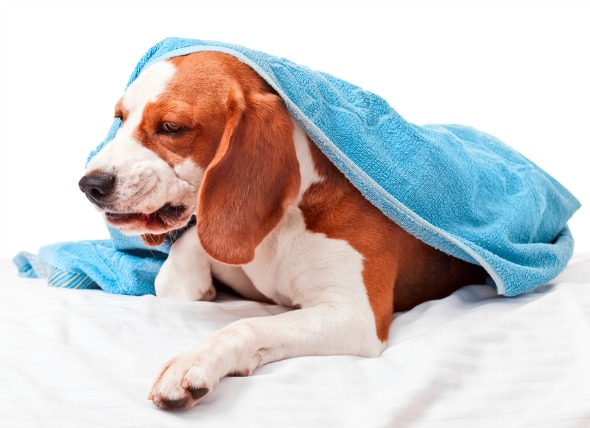Several easy to find herbs can be used as home remedies for dog gas. You can buy these herbs in the tea bag form or grow them in your garden and make your own teas.
Peppermint - Peppermint is a good herb to grow for a beginner because it is a hardy plant. People can use it in iced teas, fruit salads and vegetable salads and as a garnish. Dogs can drink it as a healing tea. Peppermint like most herbs needs full sun and you might want to keep it in a pot as it is one those herbs that tends to be invasive and take over the whole garden if not contained.
Gas remedy recipe for dogs - Steep fresh peppermint in hot water for 10 to 12 minutes, let it cool and pour it into your pets water dish. The "tea" should help settle his stomach.
Fennel - Fennel adds a sweet licorice flavor to foods and many people chew the seeds as a digestive aid and breath freshner. You can use the whole plant - leaves, stalks and bright yellow blooms in seafood dishes, chicken dishes and soup.
Cures for dog with gas -: Chop the leaves and blooms, steep them into a mild tea, and let the solution come to room temperature.. Put the mixture in his water dish and let him drink it. Fennel is thought to promote digestive health by relieving nausea and flatulence.
Chamomile - Chamomile is a remedy for many illnesses. The flowers look like tiny daisies. You make tea from the flowers but they do not need to be dried first. The herb helps reduce anxiety, combat stomach upset and insomnia.
How to make chamomile tea from flowers - The tea can be made from flowers freshly picked or dried. Freshly picked flowers can be added directly to a pot filled with just boiled water. Steep the flowers for about three minutes and then remove. Let the mixture cool and pour into your pet's dish. If you pet does not want to drink any of these "teas" try adding it their dry food or treats.
These remedies came from a sampling of veterinarians who have used these herbs to treat their patients, often in conjunction with traditional therapies. If you are unsure about trying these remedies on your pet, ask your veterinarian for dosage and application advice. Any of these remedies can also be purchased at the grocery store in the form of tea. Just prepare the tea as you normally would, let it cool and then put it in your pet's water dish.
Another way to prevent dog flatulence is to give your dog a natural product to promote digestive health. Just like humans benefit from probiotics or the good bacteria that helps our digestive system work better so do pets. Though bacteria is usually a word we associate with bad things for the body certain bacteria are not only desirable, but necessary for your pet's good health.
Some of the helpful bacteria or micoorganisms are Lactobacillus acidophilus, Bifido-bacterium bifidum and Lacto bacillus bulgaricus. These bacteria occupy your dog or cat's intestinal system and proctect them against the bad bacteria.
These kinds of bacteria are referred to as "good bacteria" because, rather than causing illness and disease, they protect your pet from harmful organisms which can invade his system. Bad bacteria can enter your pet's system for a variety of reasons such as prescription drugs which may destroy the good bacteria along with the bad bacteria, stress or advanced age which may weaken your pet's immune system, fertilizers, pesticides and other chemical pollutants which may upset the balance of bacteria.
If your pet shows any of the signs of an unhealthy intestinal tract, probiotic supplements can get his intestinal system back on the right track. Some of the most common symptoms of an unhealthy digestive tract are the following: flatulence, constipation, diarrhea, sluggishness, skin problems, Irritable Bowel Syndrome (IBS). Many vets report that a large portion of cases they see each day are due to some type of intestinal disease. People often take probiotic supplements to help keep their digestive system functioning at peak efficiency and also as a colon cancer preventative. Pets may also benefit from a regular probiotic supplemment.

 Skin Rash Due to Contact with Irritants in Dogs
Contact Dermatitis in Dogs
Contact dermatitis may
Skin Rash Due to Contact with Irritants in Dogs
Contact Dermatitis in Dogs
Contact dermatitis may
 Parasite Infection (Leishmaniasis) in Dogs
Leishmaniasis in Dogs
Leishmaniasis, the medical
Parasite Infection (Leishmaniasis) in Dogs
Leishmaniasis in Dogs
Leishmaniasis, the medical
 Canine Coronavirus Infection in Dogs
Canine Coronavirus Infection in Dogs
A canine cor
Canine Coronavirus Infection in Dogs
Canine Coronavirus Infection in Dogs
A canine cor
 Dog Flu
Canine Influenza in Dogs
The virus that ca
Dog Flu
Canine Influenza in Dogs
The virus that ca
 Anticoagulant Poisoning in Dogs
Anticoagulant Rodenticide Poisoning in Dogs
The pu
Anticoagulant Poisoning in Dogs
Anticoagulant Rodenticide Poisoning in Dogs
The pu